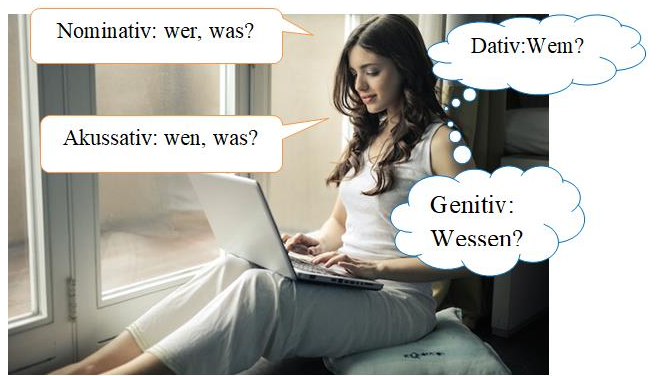In this lesson, you will learn everything you need to know about German cases, how many there are, and how to use them.
Thank you for reading this post, don't forget to subscribe!CONTENT
Case in German
Similarities and peculiarities of nouns
Similarities and peculiarities of adjectives and articles
Case Questions
What determins cases?
Subject
Verbs
Prepositions
Adjectives
Declension
Case in German
In German, many words change their form or add different endings according to their function in a sentence. For example, they change depending on whether the word is the subject or the object of the sentence. These changes and different endings are called ‘cases’.
Cases in the German language are different forms of one word that indicate their relationship to other words in the sentence, nouns can be changed by cases, and these include: NOUNS, ARTICLES, PRONOUNS AND ADJECTIVES. Changing the case of nouns is called declension.
German has four cases:
1. NOMINATIVE
2. ACCUSATIVE
3. GENITIVE
4. DATIVE
These four cases fulfill different functions. Nominative is the basic form and we mostly use it for the SUBJECT in a sentence. Accusative and dative are object complements to verbs, prepositions, and adjectives. The DIRECT OBJECT is in the accusative case and the INDIRECT OBJECT is in the dative case. The genitive is a rare type of object and usually indicates possession.
There are certain similarities between individual case forms, but also peculiarities by which you can recognize a certain case.
Similarities and peculiarities of nouns
In the German language, singular nouns look preaty the same in all four cases, although there are a few exceptions:
- in the genitive case, masculine and genitive nouns in the singular receive a suffix -(e)s
das Haus – des Hauses
der Tag – des Tages - in the dative case, the suffix -e occurs only in some cases.
im Grunde
im Sinne
in diesem Falle … - The use of the suffix -e in the dative name has a more stylistic character.
It’s the same thing with the plural, nouns have the same endings in all four cases. However, there is one exception: - In the dative plural of a noun, where it is possible, a suffix is added–(e)n:
die Wände – den Wänden
die Tage – den Tagen
die Wälder – den Wäldern - BUT!!!
die Frauen – den Frauen
die Autos – den Autos
Here it is not possible to add the ending -(e) to the dative plural.
Click on:
Grammar Contents
Similarities and peculiarities of adjectives and articles
- Articles in the nominative and accusative are the SAME except in the masculine accusative:
N: der/ein ⁕ das/ein ⁕ die/eine
A: den/ einen ⁕ das/ein ⁕ die/eine - The same applies to the plural.
N: die/–
A: die/– - In the dative singular, the masculine and neuter have the same endings:
dem/ einem - if we add an adjective:
dem/einem schönen - The suffix -en is added to the adjective, no matter how many adjectives there are, -en is always added to each adjective:
Wir leben in einem großen alten, aber sehr schönen Haus.
Case questions
The question word who (wer) is used to ask questions about living things, and the question wordwhat (was) is used for things:
- nominative: WER?, WAS? (WHO?, WHAT?)
- accusative: WEN?, WAS? (WHOM ?WHAT?)
- genitive: WESSEN? ( WHOSE?)
- dative: WEM? (WHOM?)
The answer to this question is simple: just follow the instructions given in the instructions.e.g.:
Er ist Lehrer.
WER ist Lehrer? – ER
WAS ist er? – LEHRER
Das ist das Auto des Lehrers.
WESSEN Auto ist das? – DES LEHRERS
Das Buch gehört dem Lehrer.
WEM gehört das Buch? – DEM LEHRER
Ich lese einen Roman.
WAS liest du? – EINEN ROMAN.
Er trifft seinen Freund.
WEN trifft er? – SEINEN FREUND
What determines the case?
Subject
The subject in the German sentence indicates who or what is doing the action and must not be omitted. The subject always appears in the nominative case.
Leon fährt das Auto.
Marina besucht ihre Tante.
Meine Eltern kaufen eine Wohnung.
Dieses Geschenk ist für dich.
Sie hilft mir.
Verbs
In addition to the subject, verbs often require a complement or an object. Most verbs require a complement/object in the accusative, a certain number of verbs require a complement/object in the dative, there are also verbs that require a complement/object in both the dative and the accusative. Only a few verbs require a complement/object in the nominative or genitive case.
Leon fährt das Auto.
Marina besucht ihre Tante.
Meine Eltern kaufen eine Wohnung.
Er schenkt seiner Frau eine Kette.
Sie hilft mir.
Er heißt ein guter Schauspieler.
Sie bedarf der Hilfe.
Prepositions
Prepositions also need a complement, which can be in the accusative, dative, or genitive case. In the case of alternating prepositions (prepositions that require accusative and dative), the case is determined by means of verbs (verbs of motion and rest).
Er spricht mit dem Chef.
Das ist für dich.
Wegen deiner Verspätung haben wir das Flugzeug verpasst.
Ich bin in der Stadt.
Ich gehe in die Stadt.
Adjectives
A small number of adjectives require complement in the accusative, dative or genitive case.
A: einen Meter groß
D: meinem Freund wichtig
G: des Problems bewusst
Click on:
Grammar Contents
Declension
| Cases | Wer oder Was? Nominative | Wen oder Was? Accusative | Wessen? Genitive | Wem? Dative |
| Masculine | der Mann ein Mann | den Mann einen Mann | des Mannes eines Mannes | dem Mann einem Mann |
| Feminine | die Frau eine Frau | die Frau eine Frau | der Frau einer Frau | der Frau einer Frau |
| Neuter | das Kind ein Kind | das Kind ein Kind | des Kindes einesKindes | dem Kind einem Kind |
| Plural | die Männer die Frauen die Kinder | die Männer die Frauen die Kinder | der Männer der Frauen der Kinder | den Männern den Frauen den Kindern |
See more:



